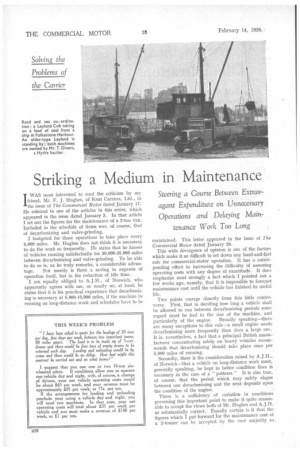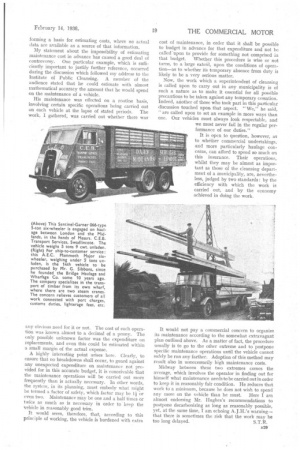Striking a Medium in Maintenance
Page 38

Page 39

If you've noticed an error in this article please click here to report it so we can fix it.
Steering a Course Between Extravagant Expenditure on Unnecessary Operations and Delaying Maintenance Work Too Long IWAS most interested to read the criticism by my friend, Mr. F. J. Hughes, of Kent Carriers, Ltd., in the issue of The Commercial Motor dated January 17. He referred to one of the articles in this series, which appeared in the issue dated January 3. In that article I set out the figures for the maintenance of a 2-ton van. Included in the schedule of items was, of course, that of decarbonizing and valve-grinding.
I budgeted for those operations to take place every 5,000 miles. Mr. Hughes does not think it is necessary to do the work so frequently. He states that he knows of vehicles running satisfactorily for 30,000-35,000 miles between decarbonizing and valve-grinding. To be able to do so is, as he truly remarks, a considerable advan tage. Not merely is there a saving in expense of operation itself, but in the reduction of idle time.
I am equally obliged to A.J.H., of Norwich, who apparently agrees with me, or nearly so; at least, he states that it is his practical experience that decarbonizing is necessary at 5,000-10,000 miles, if the machine be running on long-distance work and schedules have to be
maintained. This letter appeared in the issue of The Commercial Motor dated January 24.
This wide divergence of opinion is one of the factors which make it so difficult to set down any hard-and-fast rule for commercial-motor operation. It has a corresponding effect in increasing the difficulty of assessing operating costs with any degree of exactitude. It does emphasize most strongly a fact which I pointed out a few weeks ago, namely, that it is impossible to forecast maintenance cost until the vehicle has finished its useful life.
Two points emerge directly from this little controversy. First, that in deciding how long a vehicle shall be allowed to run between decarbonizing periods some regard must be had to the size of the machine, and particularly of the engine. Broadly speaking—there are many exceptions to this rule-7a small engine needs decarbonizing more frequently than does a large one. It is, nevertheless, a. fact that a principal British manufacturer concentrating solely on heavy vehicles recommends that decarbonizing should take place once per 5,000 miles of running.
Secondly, there is the consideration raised by A.J.H., of Norwich—that a vehicle on long-distance work must, generally speaking, be kept in better condition than is necessary in the case of a "potterer." It is also true, of course, that the period which may safely elapse between one decarbonizing and the next depends upon the condition of the engine.
There is a sufficiency of variation in conditions. governing this important point to make it quite reasonable to accept the views both of Mr. Hughes and A.J.H. as substantially correct. Equally certain is it that the • figures which I put forward for the maintenance cost of a 2-tonner can be accepted by the vast majority as . forming a basis for estimating costs, where no actual data are available as a source of that information.
My statement about the impossibility of estimating maintenance cost in advance has caused a good deal of controversy. One particular example, which is sufficiently important to justify further reference, occurred during the discussion which followed my address to the Institute of Public Cleansing. A member of the audience stated that he could estimate with almost . mathematical accuracy the amount that he would spend on the maintenance of a vehicle.
His maintenance was effected on a routine basis, involving certain specific operations being carried out on each vehicle at the lapse of stated periods. The work, I gathered, was carried out whether there was
any obvious need for it or not. The cost of each operation was known almost to a decimal of a penny. The only possible unknown factor was the expenditure on replacements, and even this could be estimated within a small margin of the actual expense.
A highly interesting point arises here. Clearly, to ensure that no breakdowns shall occur, to guard against any unexpected expenditure on maintenance not provided for in this accurate budget, it is conceivable that the maintenance operations will be carried out more frequently than is actually necessary. In other words, the system, in its planning, must embody what might be termed a factor of safety, which factor may be 14 or even two. Maintenance may be one and a half times or twice as much as is necessary in order to keep the vehicle in reasonably good trim.
It would seem, therefore, that, according to this principle of working, the vehicle is burdened with extra cost of maintenance, in order that it shall be possible to budget in advance for that expenditure and not be called' upon to provide for something not comprised in that budget. Whether this procedure is wise or not turns, to a• large extent, upon the conditions of operation—as to whether its temporary absence from duty is likely to be a very serious matter.
Now, the work which a superintendent of cleansing is called upon to carry out in any municipality is of such a nature as to make it essential for all possible precautions to be taken against any temporary cessation. Indeed, another of those who took part in this particular discussion touched upon that aspect. "We," he said, "are called upon to set an example in more ways than one. Our vehicles must always look respectable, and we must never fail in the regular per formance of on duties."
It is open to question, however, as to whither commercial undertakings, and more particularly haulage concerns, can afford to spend so much on this insurance. Their operations, whilst they may be almost as important as those of the cleansing department of a municipality, are, nevertheless, judged by two standards : by the efficiency with which the work is carried out, and by the economy achieved in doing the work.
It would not pay a commercial concern to organize its maintenance according to the somewhat extravagant plan outlined above. As a matter of fact, the procedure usually is to go to the other extreme and to postpone specific maintenance operations until the vehicle cannot safely be run any farther. Adoption of this method may result also in unnecessarily high maintenance costs.
Midway between these two extremes comes the average, which involves the operator in finding out for himself what maintenance needs to be carried out in order to keep it in reasonably fair condition. He reduces that work to a minimum, because he does not wish to spend any more on the vehicle than he must. Here I am almost endorsing Mr. Hughes's recommendations to postpone decarbonizing as long as reasonably possible, yet, at the same time, I am echoing A.J.H.'s warning— that there is sometimes the risk that the work may be
too long delayed. S.T.R.




















































































